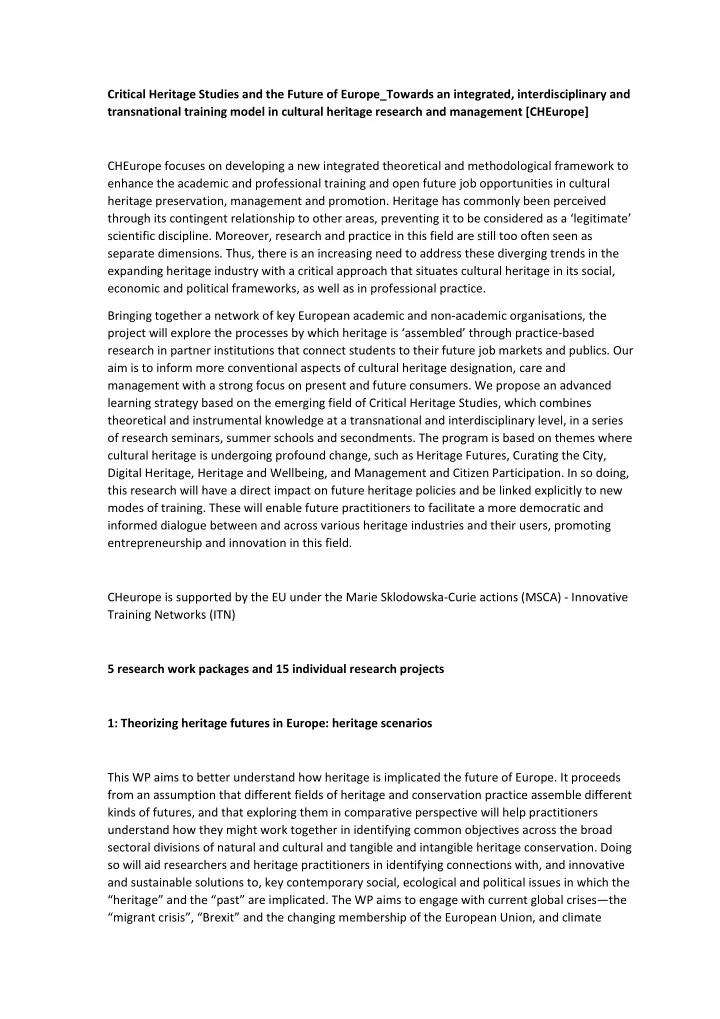

Critical Heritage Studies and the Future of Europe_Towards an integrated, interdisciplinary and transnational training model in cultural heritage research and management [CHEurope] CHEurope focuses on developing a new integrated theoretical and methodological framework to enhance the academic and professional training and open future job opportunities in cultural heritage preservation, management and promotion. Heritage has commonly been perceived through its contingent relationship to other areas, preventing it to be considered as a ‘legitimate’ scientific discipline. Moreover, research and practice in this field are still too often seen as separate dimensions. Thus, there is an increasing need to address these diverging trends in the expanding heritage industry with a critical approach that situates cultural heritage in its social, economic and political frameworks, as well as in professional practice. Bringing together a network of key European academic and non ‐ academic organisations, the project will explore the processes by which heritage is ‘assembled’ through practice ‐ based research in partner institutions that connect students to their future job markets and publics. Our aim is to inform more conventional aspects of cultural heritage designation, care and management with a strong focus on present and future consumers. We propose an advanced learning strategy based on the emerging field of Critical Heritage Studies, which combines theoretical and instrumental knowledge at a transnational and interdisciplinary level, in a series of research seminars, summer schools and secondments. The program is based on themes where cultural heritage is undergoing profound change, such as Heritage Futures, Curating the City, Digital Heritage, Heritage and Wellbeing, and Management and Citizen Participation. In so doing, this research will have a direct impact on future heritage policies and be linked explicitly to new modes of training. These will enable future practitioners to facilitate a more democratic and informed dialogue between and across various heritage industries and their users, promoting entrepreneurship and innovation in this field. CHeurope is supported by the EU under the Marie Sklodowska ‐ Curie actions (MSCA) ‐ Innovative Training Networks (ITN) 5 research work packages and 15 individual research projects 1: Theorizing heritage futures in Europe: heritage scenarios This WP aims to better understand how heritage is implicated the future of Europe. It proceeds from an assumption that different fields of heritage and conservation practice assemble different kinds of futures, and that exploring them in comparative perspective will help practitioners understand how they might work together in identifying common objectives across the broad sectoral divisions of natural and cultural and tangible and intangible heritage conservation. Doing so will aid researchers and heritage practitioners in identifying connections with, and innovative and sustainable solutions to, key contemporary social, ecological and political issues in which the “heritage” and the “past” are implicated. The WP aims to engage with current global crises—the “migrant crisis”, “Brexit” and the changing membership of the European Union, and climate
change, for example—and the ways in which these crises might be viewed and analysed from the perspective of critical heritage studies. The WP has three key objectives: 1/To develop methodologies, based on broadly ethnographic approaches, which facilitate comparative perspectives on heritage across broad sectoral divisions. 2/To undertake comparative studies based on a dialogical model of heritage (Harrison 2013) drawing on these methods. 3/To explore the practical implications of working within an expanded field of heritage across sectoral divisions by exploring ways of linking the outcomes of this research to important contemporary social, political or ecological issues. These objectives relate directly to the Council of Europe’s Framework Convention on the Value of Cultural Heritage for Society (the Faro Convention), which specifies the need to promote integrated trans ‐ sectoral approaches to cultural heritage and to facilitate more democratic participation in the identification and management of heritage values in society. Fellow ESR1 – Host institution University of Lisbon (Nélia Dias) – Cultural difference, migration crisis and the future of European heritage. Please send your requests for information / your application to: gai@iscte.pt This comparative project will explore issues of heritage and identity in relation to questions of cultural difference (with a possible focus on the refugee or migrant crisis) and the ways in which these are articulated across key contemporary debates relating to the future of Europe. We invite proposals which explore these questions through the lens of: a) material culture studies ‐ exploring for example the circulation of objects and commodities and the issue of portable heritage; b) contemporary museological representations of European identities; c) intangible expressions and practices; as arenas in which material objects and intangible heritage are recirculated and loaded with new political meaning. In addition to participating in network training activities and doctoral research, the successful applicant will undertake a secondment with one of the project partners to engage in heritage and museological work related to the WP theme. The objectives of the project are to consider how heritage is being transformed in relation to contemporary social, cultural and economic crises and the future trajectories of heritage in Europe. It will also contribute to the overall objectives of WP1 to develop methodologies which facilitate comparative perspectives on heritage across broad sectoral divisions; to undertake comparative studies based on a dialogical model of heritage (Harrison 2013) drawing on these methods; and to explore the practical implications of working within an expanded field of heritage. Fellow ESR2 – Host institution University College London (Rodney Harrison) ‐ Climate change and the future of European heritage. Full details of this position and its application procedures will be made available on the UCL Jobs website http://www.ucl.ac.uk/hr/jobs/ For further information about the position and its application procedures, contact Rodney Harrison (r.harrison@ucl.ac.uk) This comparative project will explore responses to climate change in relation to specific national and international initiatives across natural and cultural heritage management agencies which attempt to engage with issues raised by climate change and future ecological forecasting,
Recommend
More recommend